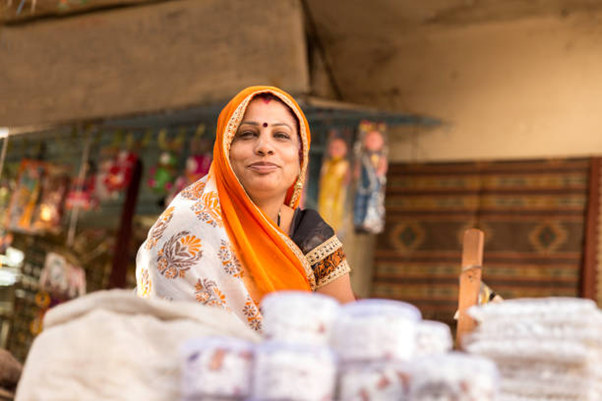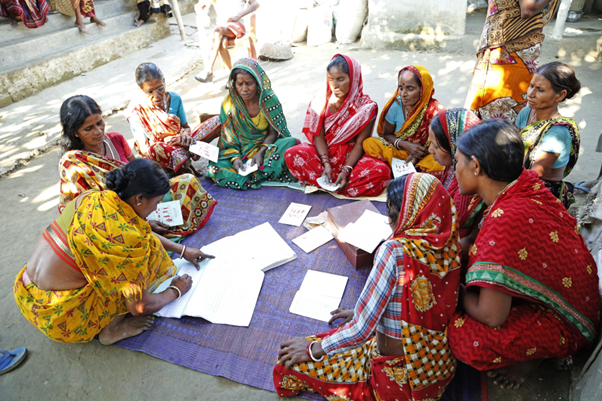On 17th May 2024 the Private Sector Development Research Network (PSDRN), in collaboration with The Wheeler Institute for Business and Development, hosted a thought-provoking seminar titled “Business and Gender Empowerment: Can Selling Make You More Resilient? Experimental Evidence from India.” Led by Iris Steenkamp (Assistant Professor of Marketing at Bocconi University and LBS PhD 2022) and moderated by Rajesh Chandy (Co-Academic Director of The Wheeler Institute), the event delved into ground-breaking research exploring the role of sales employment in building resilience among women in rural India.

The seminar focused on research conducted during the COVID-19 pandemic involving over 1,048 women in rural Uttar Pradesh, India. Led by Iris Steenkamp, this study sought to understand how engagement in sales activities could enhance resilience—defined as the ability to cope with adversity—among economically and socially disadvantaged groups.
The research aims to explore whether door-to-door sales employment can build resilience, especially among vulnerable communities. Resilience is a crucial determinant in one’s ability to cope overcoming sudden, devastating external shocks.
The randomised controlled trial divided participants into three groups: those assigned to sales activities (treatment employment), those engaged in market research (placebo employment), and a pure control group with no employment. This investigation offers a novel perspective on the causal relationship between employment type and resilience.
Key Findings
Building Connections
One of the study’s main findings was that sales employment significantly helped women build connections with influential individuals, including NGO workers, government officials, and other community leaders. These connections were instrumental in raising awareness of and access to external sources of help, such as relief programs. This networking effect was particularly pronounced among women from the most socially isolated groups within their communities
Economic and Psychological Resilience
The study revealed that women employed in sales roles exhibited higher levels of both economic and psychological resilience. Economic resilience was measured by their awareness and take-up of relief programs, while psychological resilience was assessed through their ability to cope with adversity and their optimism about the future. Those assigned to sales activities were aware of significantly more sources of relief, took-up more relief programs and were less pessimistic about the future compared to placebo and control groups.
Impact on Marginalised Groups
The research highlighted that the benefits of sales employment were most significant for women with the lowest base levels of access to resources and information, who on average experienced the greatest gains in resilience. This finding underscores the transformative potential of sales employment in empowering the most disadvantaged members of society.

Mechanisms of Resilience
The researchers proposed that the primary mechanism through which sales employment improved resilience was through facilitating the opportunity to create wide-ranging connections. The nature of sales roles inherently entails interaction with a wide array of individuals. Drawing from social learning theory, the researchers argue that a wide set of connections are a key driver in overcoming informational isolation—a critical barrier to resilience.
While controlling for the network connections individuals have is typically infeasible, the random assignment to sales roles offered controlled interaction opportunities, paving the way for robust conclusions on the role of connections in fostering resilience (Jackson 2014).
The results show that by interacting with a diverse set of people, saleswomen gained access to critical information about available resources and how to access them. This broadened network not only provided practical support but also enhanced the women’s psychological resilience.
Challenges and Considerations
Reverse Causality and Self-Selection Bias
One challenge addressed in the research was the potential for reverse causality—whether inherently resilient women were more likely to engage in sales employment. To deal with these threats, the researchers designed and implemented a placebo employment condition and randomly assigned participants, at block-level, to a treatment arm. This is one of the first studies to randomly assign participants to employment and measure the impact of employment in the individual, in this case on their resilience.
Income & Employment Effects
The placebo ‘market research’ employment condition was introduced to control for confounding variables related to income and employment effects. The placebo intervention mirrored the sales treatment in all respects (most notably, creating income as well as uncertainty regarding income). This design ensured comparable employment contexts and income structures, allowing researchers to isolate the specific effects of sales employment on resilience.
Implications for Policy and Practice
Empowering Women through Employment
This work responds to the global call for more in-depth knowledge on fostering resilience among impoverished and vulnerable communities (United Nations 2020), making salient contributions conceptually and practically. The research findings demonstrate that sales employment significantly bolsters both economic and psychological resilience, primarily through enhanced awareness of relief programs and improved access to formal aid. They also suggest that similar employment interventions could be scaled and adapted to other contexts to support vulnerable populations.
Incorporating Wide Connections in Employment Programs
This research underscores the synergy between corporate initiatives and public and civil efforts in improving social outcomes. It addresses the persistent issue that many eligible individuals do not claim available benefits (De la Rosa et al. 2021). It advocates for policies that encourage connection-building between those in need and institutional affiliates to enhance program uptake. As marketing roles proliferate globally, the capacity for adversity resilience could similarly expand, supported by the relational opportunities these positions offer.
Future Research Directions
Gender Empowerment and Leadership
The seminar also previewed ongoing research on the broader impacts of employment on gender empowerment. Preliminary results indicate that sales employment not only enhances resilience but also promotes gender empowerment, such as take-up of other employment, leadership roles and community participation. These findings suggest that employment can be a powerful tool for fostering gender equality and empowerment.
About the speakers

Iris Steenkamp is an Assistant Professor at Bocconi University and holds a PhD in marketing from London Business School. Her research explores the impact of marketing (as an intervention or a mechanism) in emerging markets. By implementing large-scale field experiments, her research aims to provide a new perspective on central marketing concepts by linking these to key social and economic development outcomes. Ongoing projects examine the impact of sales employment on gender empowerment and resilience in India and the effectiveness of loyalty programs in a supplier-company setting in Rwanda. Her dissertation has been recognized by various institutions, including the American Marketing Association, INFORMS, and the Research and Development Management Association. For more details about Dr. Steekamp’s work, visit here.

Rajesh Chandy is a Professor of Marketing at London Business School, and the Co-Academic Director of the Wheeler Institute for Business and Development. Professor Chandy served a Co-Editor of the Journal of Marketing special issue on “Better Marketing for a Better World,” and is also co-editor of the Management Science special issue on “Business and Climate Change.” He previously served as an Area Editor for the Entrepreneurship and Innovation area at Management Science. During 2006-2008, Dr. Chandy served as a member of the US Secretary of Commerce Advisory Committee on Measuring Innovation in the 21st Century Economy. He currently serves as an Independent Director on the board of Laurus Labs Limited, a publicly listed pharmaceutical company, and on the Board of Governors of London Business School. He received his PhD from the University of Southern California. In 2018, he was elected a Fellow of the British Academy. For more details about Dr. Chandy’s work, visit here.
About the author

Mahesh Jamb, MBA2025 has a dynamic background in Indian tech startups, particularly in the e-beauty sector. With four years of experience, his most recent role involved leading the Data Product Team at a renowned e-beauty unicorn, focusing on pricing automation and other data-driven initiatives. His passion lies in fostering innovative growth and sustainability within SMEs in developing countries, especially in the consumer sector. Mahesh’s journey is marked by a commitment to leveraging technology for strategic advancements and impactful business solutions.
